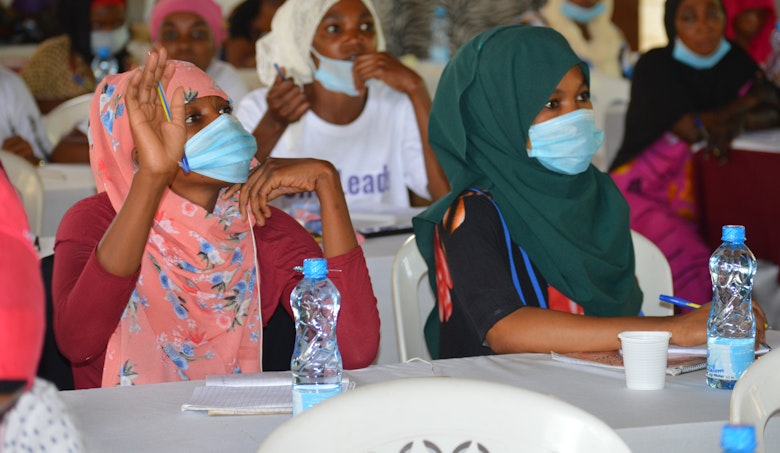Strengthening Girls and Young women's participation in decision making
International Women's Day is a global day celebrating the social, economic, cultural, and political achievements of women. The day also marks a call to action for accelerating gender parity. The world came together on 8 March 2022 to celebrate women's achievements and reinforce a commitment to women's equality. Significant activities were witnessed worldwide as groups came together to celebrate women's achievements and rally for women's equality.
Building and strenghtening GYW participation
In Kenya, the Government has over time repealed some retrogressive domestic laws and introduced new laws and policies, systems, and structures that aim at safeguarding the gains for women and protecting them from discrimination as provided for in the Constitution of Kenya (2010). The country has been implementing the Constitution of Kenya (2010) that has elaborate provisions on economic, social, and cultural rights under the Bill of Rights. One of the policy and legal frameworks that have been developed/enacted to promote, enforce and monitor equality, equity, and nondiscrimination (SDG target 5.1 indicator 5.1.1) is the National Policy on Gender and Development (2019).
While the Government of Kenya has developed and adopted policies, enacted laws, developed and implemented educational programmes to combat discrimination against women, the response is constrained by the lack of capacity for prevention and protection, entrenched religious and cultural beliefs that perpetuate negative stereotypes, discrimination, gender inequality, and socio-cultural norms around gender and masculinity.
There are many gender-related challenges facing girls and young women, including retrogressive social and cultural practices. One of the key gender norms hindering girls' and young women’s voice, leadership, and participation, is the gendered division of roles. These norms not only underpin sexist attitudes and beliefs that boys and men make better leaders than girls and women, but they also negatively impact girls' and young women’s aspirations to engage in public life, take up leadership roles or run as candidates. Furthermore, the gendered division of roles also leads to girls and young women having less access than boys and men to the resources, time, skills, education, the formal and informal social networks and connections that are needed to effectively participate in public decision-making, whether as a member of a civil society organisation, voter, political candidate or community leader.
To ensure sustainability in addressing this, the cultural and religious leaders should be engaged as Champions of Change to lead the community in targeted dialogue to transform negative gender and social norms. They should lead in challenging and transforming discriminatory social norms.
There has been a trend towards increased activism and participation of GYW in civic associations, ranging from community-based organisations and youth associations to national-level popular protest movements. However, increased levels of GYWs’ socio-political participation mask substantial differences between specific groups of girls and young women. Some groups experience greater barriers to participating in collective action or to being heard and represented by (more established) CSOs. Among these groups are GYW from remote, rural areas and urban slums, internally displaced and refugee GYW, girls and young women survivors of gender-based violence, GYW with disabilities, GYW from sexual minorities, and those who are not in school.
To scale up the GYW influence, the government and civil society actors need to build and strengthen the capacities of the GYW, especially the marginalised and disadvantaged groups (rural and urban) to take lead and set their own advocacy agenda in the areas of gender equality and their rights.
While young people, in general, lack true political representation, and the decision-making in most counties is dominated by elder people, young women and girls are additionally excluded from formal and informal decision-making structures because of their gender. The negative framing and the lack of effective mechanisms for young people particularly the GYW to voice their demands, to be heard, and to be able to hold authorities accountable, have motivated many young people to engage in street protests and mass demonstrations. Youth activism is on the rise and across the country, GYW are increasingly at the frontline of the protests, risking police violence and threats and intimidation on social media.
Programmes focused on girls and young women need to be supported to enable them to effectively and meaningfully participate in the political spaces. Their collective action and advocacy towards formal and informal authorities need to be supported as well to ensure their voices have been heard.
One of the programmes focused on advancing this is She Leads, a joint initiative of Plan International Netherlands, Defence for Children - ECPAT Netherlands (DCI-ECPAT), The African Women’s Development and Communication Network (FEMNET), and Terre des Hommes Netherlands (TdH NL) in strategic partnership with the Ministry of Foreign Affairs of the Netherlands, under the Power of Voices Framework for the period 2021-2025 and Equal Measures 2030 as a technical partner.
She Leads Kenya consortium unites child rights organisations, feminist/women’s rights organisations, youth-led organisations, girl-led and (young) women-led organisations and groups, and aims to contribute to the institutionalization of meaningful participation and influence of GYW in both formal and informal institutions, in a more just and inclusive environment towards the realisation of the Country's development goals and gender-focused commitments, including the UN’s Sustainable Development Goal 5 (SDG 5).
The Government and the Civil society actors need to collaborate with each other to ensure a sustainable influence of Girls and young women in decision making. Working together ensures the policies formulated are implemented and the GYW are safeguarded and strengthened to engage at any decision-making level.
Op-ed article written by Caroline Boraya, She Leads Consortium Coordinator, Terre des Hommes Netherlands

